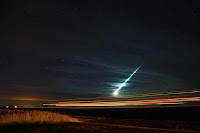The UK Meteor Observation Network has recieved roports of a bright fireball meteor being seen over much of southern England slightly after 3.15 am GMT on Thursday 17 March 2016. The fireball has been described as being greenish in colour, which may indicate it was caused by the explosion of a small meteorite with a high iron content, and was seen from the Hampshire coast as far north as Stafford, and east to the coast. A fireball is defined as a meteor (shooting star) brighter than the
planet Venus. These are typically caused by pieces of rock burning up in
the atmosphere, but can be the result of man-made space-junk burning up
on re-entry.
Image of the 17 March 2016 English meteor. UK Meteor Observation Network/Hampshire Astronomical Group/Clanfield Observatory.
Objects of this size probably enter the Earth's atmosphere several times
a year, though unless they do so over populated areas they are unlikely
to be noticed. They are officially described as fireballs if they
produce a light brighter than the planet Venus. It is possible that this object will have produced meteorites that reached
the surface (an object visible in the sky is a meteor, a rock that falls
from the sky and can be physically held and examined is a meteorite).
Witness reports can help astronomers to understand these events. If you
witness a fireball-type meteor over the UK you can report it to the UK Meteor Observation Network here.
See also...
 Fireball seen over southern France and northern Italy. A bright fireball was seen over much of southeast France and northern
Italy at about 6.20 pm local time on Wednesday 17...
Fireball seen over southern France and northern Italy. A bright fireball was seen over much of southeast France and northern
Italy at about 6.20 pm local time on Wednesday 17... Meteorite unlikely to have killed man in Tamil Nadu. Indian newspaper The Hindu carried a report
on Sunday 7 February 2016 in which the death of a man and injury of
three other people as well as causing damage to several nearby buildings
at the campus of a college in Vellore, Tamil Nadu, were described as...
Meteorite unlikely to have killed man in Tamil Nadu. Indian newspaper The Hindu carried a report
on Sunday 7 February 2016 in which the death of a man and injury of
three other people as well as causing damage to several nearby buildings
at the campus of a college in Vellore, Tamil Nadu, were described as... Bright fireball over Saskatchewan and Manitoba. Many people have reported seeing a bright fireball over parts of
southern Saskatchewan and Manitoba at about 8.40 pm local tine on Sunday
8 November 2015. A fireball is defined as a meteor (shooting star)...
Bright fireball over Saskatchewan and Manitoba. Many people have reported seeing a bright fireball over parts of
southern Saskatchewan and Manitoba at about 8.40 pm local tine on Sunday
8 November 2015. A fireball is defined as a meteor (shooting star)...
Follow Sciency Thoughts on Facebook.

